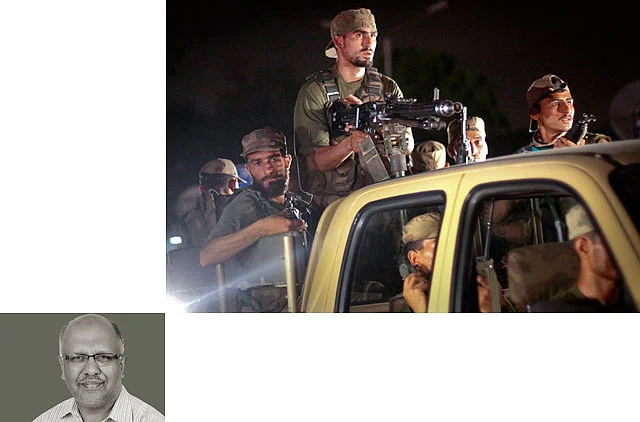The recent arrest of a senior Pakistan army officer reported in connection with links to a hardline group has been seen by many across the country as an unusual event. Though there have been suspicions periodically over armed forces personnel establishing contacts with political and religious groups, such cases have seldom been documented in public.
The case of Brigadier Ali Khan, detained for investigations into his links with Hizb-ul-Tahrir, has suddenly caught attention as an example of an internal breakdown of discipline within a supposedly well-disciplined force. As always, the truth must lie somewhere in the middle — between what is reality and what is indeed imagination.
Undoubtedly, Brigadier Khan's case and a subsequent report of four army majors being questioned in connection with his case, has overshadowed the Pakistan army's image. To its critics, the army has been badly exposed as an institution where contacts between individual officers and outside entities critical of the institution are rife.
Across Pakistan, some analysts have recently even expressed anxiety over such cases being used to cast fresh doubts over security surrounding Pakistan's nuclear assets. If so, this would be based on the argument that a force whose officers are known to be linked to militant groups can simply not be trusted with the safe-keeping of a nuclear arsenal.
Yet all the hype surrounding Brigadier Khan's case can easily sidetrack it from reality. A revelation of the arrest provides evidence of a determination by the institution to begin a clean-up before conditions slip out of control. From a half-a-million-strong force, there is bound to be the odd case of indiscipline to be tackled, goes the argument in defence of Pakistan's armed forces.
Revelations
As investigations proceed, it is difficult to tell how many more revelations will surface either in relation to Brigadier Khan's own case or that of other individuals who may be out of line. What is however clear is that for elements outside Pakistan, this case may be the defining characteristic for at least some time to come.
The danger for both Pakistan and the outside world is that getting caught in a deepening controversy surrounding real or imaginary rogue elements within the Pakistan armed forces could indeed distract from tackling a bigger challenge.
That challenge is essentially about securing and sustaining an improvement in global security interests in Afghanistan and the fight that must be won against hardcore militants who are currently fighting Pakistan's armed forces and US-led western forces in the Afghanistan-Pakistan region.
Mopping up
Instead, a distraction which tends to focus increasingly on Pakistan's determination or capacity to deal with this conflict, will only boomerang to everyone's disadvantage. Going forward, there are a number of important imperatives. First and foremost, it is vital for Pakistan to come clean with the facts as they unfold. Any effort to conceal further developments will only create the risk of their subsequent revelation in a way that will cause embarrassment to the country's military establishment.
But at the same time, stakeholders from outside Pakistan who choose to criticise the country, though closely wedded to the country's affairs, must recognise that it is in their best interests to mop up the fall-out and move on.
This is a time when Pakistan needs to be supported in its endeavour to clean up rather than being taken to task for a situation that may not be entirely of its own making.
In the aftermath of the May 2 attack by US special forces which killed Osama Bin Laden in the northern city of Abbottabad, Pakistan's military and intelligence community have already found themselves under the scanner. The country's age-old ties to hardline groups including those that it supported in the 1980s with money from the US, to fight the former Soviet Union's occupation of Afghanistan, have been brought into question.
In the heat of the moment, it is possible for many to lose sight of fundamentally vital realities. Some of the militant groups that were nurtured by Pakistan's military in the past have clearly turned against their former patrons. In the past two years, attacks on units of Pakistan's army operating in the country's tribal areas along the Afghan border have underlined this trend. The attacks have come from groups including those which once boasted the patronage of the Pakistan army and the intelligence services.
Farhan Bokhari is a Pakistan-based commentator who writes on political and economic matters.
Sign up for the Daily Briefing
Get the latest news and updates straight to your inbox
Network Links
GN StoreDownload our app
© Al Nisr Publishing LLC 2025. All rights reserved.
